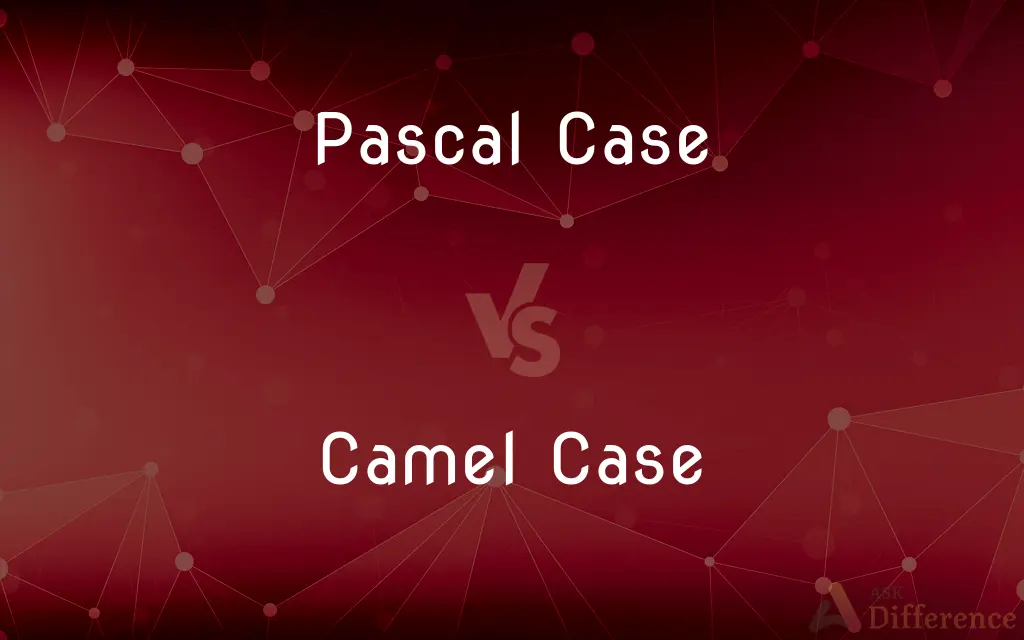Pascal Case vs. Camel Case — What's the Difference?
Edited by Tayyaba Rehman — By Fiza Rafique — Published on December 21, 2023
Pascal Case capitalizes the first letter of every word without spaces (e.g., PascalCase). Camel Case capitalizes the first letter of every word except the first (e.g., camelCase).

Difference Between Pascal Case and Camel Case
Table of Contents
ADVERTISEMENT
Key Differences
Pascal Case is a naming convention in which the first letter of each word is capitalized without spaces or punctuation. It is often used in programming languages to name classes or types. For example, in the .NET framework, class names like "CustomerOrder" or "EmployeeDetails" often follow the Pascal Case convention.
Camel Case, on the other hand, is a naming convention where the first letter of the first word is in lowercase and the first letter of each subsequent concatenated word is capitalized. Camel Case is frequently used for variable or method names in programming. A classic example is a variable name like "employeeList" or a method name such as "getOrderDetails".
Both Pascal Case and Camel Case are part of the wider family of naming conventions used in programming and coding. Their primary purpose is to enhance readability by clearly differentiating separate words within a compound term, without the need for spaces or underscores.
It's essential to understand that both Pascal Case and Camel Case are merely conventions, and different programming languages or projects might have different guidelines or standards. Still, the recognition of Pascal Case starting with an uppercase letter and Camel Case starting with a lowercase letter is a consistent differentiation between the two.
In summary, while both Pascal Case and Camel Case serve to increase clarity in naming structures, they differ in the capitalization of the initial word. Pascal Case starts with an uppercase, while Camel Case starts with a lowercase.
ADVERTISEMENT
Comparison Chart
Starting letter
Uppercase
Lowercase
Subsequent words' first letter
Uppercase
Uppercase
Use Case in Programming
Class names, Types
Variables, Methods
Example
"ProductItem"
"productItem"
Origin of Name
Named after Pascal language
Describes hump-like appearance
Compare with Definitions
Pascal Case
Pascal Case capitalizes the initial letter of each concatenated word.
For instance, DatabaseConnection is in Pascal Case.
Camel Case
Camel Case is a naming format where each new word after the first starts with an uppercase.
A variable named orderList represents camelCase.
Pascal Case
Pascal Case joins words without spaces, using uppercase for each word's start.
UserInformation exemplifies Pascal Case.
Camel Case
Camel Case is a common convention for naming variables or methods.
GetProductPrice is a typical camelCase method name.
Pascal Case
Pascal Case is a naming convention often used for class names.
An example would be OrderDetails in Pascal Case.
Camel Case
Camel Case begins with a lowercase letter followed by capitalized words.
For example, employeeDetails is in camelCase.
Pascal Case
Pascal Case starts every new word within the term with a capital letter.
DateOfBirth is a sample in Pascal Case.
Camel Case
Camel Case starts with a lowercase and capitalizes each subsequent word's start.
FirstName and lastName are both in camelCase.
Pascal Case
Pascal Case combines words with the first letter of each capitalized.
Consider the term CreditCardNumber as Pascal Case.
Camel Case
Camel Case has a hump-like appearance due to the mix of lowercase and uppercase.
Consider userProfile as an instance of camelCase.
Common Curiosities
What is Pascal Case?
Pascal Case is a naming convention where every word is capitalized without spaces, e.g., "SampleName".
How does Camel Case differ from Pascal Case?
Camel Case starts with a lowercase letter, while Pascal Case starts with an uppercase, e.g., "camelCase" vs. "PascalCase".
Can Pascal Case and Camel Case be used interchangeably?
While technically possible, it's best to stick to one style consistently within a project or context for clarity.
Is Camel Case more common in specific programming languages?
Yes, some languages like JavaScript tend to prefer Camel Case for certain naming tasks.
Is Pascal Case also known as "Upper Camel Case"?
Yes, some consider Pascal Case as "Upper Camel Case" because of its similarity to Camel Case but starting with an uppercase letter.
How do I convert a phrase to Pascal Case?
Remove spaces, and capitalize the first letter of each word, e.g., "sample name" becomes "SampleName".
Why is Camel Case named so?
The name "Camel Case" comes from its hump-like appearance, where words after the first start with an uppercase.
How does Pascal Case improve code readability?
Pascal Case clearly differentiates separate words within a compound term, making it easier to read.
Where is Pascal Case commonly used?
Pascal Case is often used in programming for naming classes or types.
Is Pascal Case named after the Pascal programming language?
Yes, the naming convention is believed to be named after the Pascal language.
Why are naming conventions like Pascal Case and Camel Case important?
They provide consistency and clarity in code, making it more maintainable and understandable.
Which naming convention is better: Pascal Case or Camel Case?
Neither is inherently better; the choice depends on the specific context, language guidelines, or project standards.
What's a common use of Camel Case in programming?
Camel Case is frequently used for variable or method names.
Are there other naming conventions besides Pascal Case and Camel Case?
Yes, other conventions include snake_case and kebab-case, among others.
What is the key difference to remember between Pascal Case and Camel Case?
Pascal Case starts with an uppercase letter, while Camel Case starts with a lowercase letter.
Share Your Discovery

Previous Comparison
ALTER in IT vs. UPDATE in IT
Next Comparison
ATL Marketing vs. BTL MarketingAuthor Spotlight
Written by
Fiza RafiqueFiza Rafique is a skilled content writer at AskDifference.com, where she meticulously refines and enhances written pieces. Drawing from her vast editorial expertise, Fiza ensures clarity, accuracy, and precision in every article. Passionate about language, she continually seeks to elevate the quality of content for readers worldwide.
Edited by
Tayyaba RehmanTayyaba Rehman is a distinguished writer, currently serving as a primary contributor to askdifference.com. As a researcher in semantics and etymology, Tayyaba's passion for the complexity of languages and their distinctions has found a perfect home on the platform. Tayyaba delves into the intricacies of language, distinguishing between commonly confused words and phrases, thereby providing clarity for readers worldwide.














































